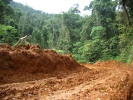 The announced legalization of 15 additional forest titles undermines the findings of the legal review concluded in November 2008. It would lead to a total of approx 15 million hectares - or five times of Belgium - of rainforest given away to the industrial logging companies. All titles operated at the time of the forest titles legal review -started in 2005 in order to clean up the DRC's forest sector- will have been finally found 'convertible' to long-term official concessions.
The announced legalization of 15 additional forest titles undermines the findings of the legal review concluded in November 2008. It would lead to a total of approx 15 million hectares - or five times of Belgium - of rainforest given away to the industrial logging companies. All titles operated at the time of the forest titles legal review -started in 2005 in order to clean up the DRC's forest sector- will have been finally found 'convertible' to long-term official concessions.
As a result, this long, costly process of the legal review will have failed to clean up an industry often criticized for promoting illegal practices and tax evasion, generating social conflicts between forest population and companies, and causing the fragmentation of intact forest blocks.
The plan to lift the moratorium on the allocation of new forest titles, as announced by the Minister, would also open the door to the exploitation of an additional 10 million hectares, based on previous official statements and documents issued by the ministry .
It is up to 25 million hectares of Congolese forest in total that could be sacrificed for industrial exploitation, instead of considering seriously a better future for the forests, the people and the climate
"Not only is the legalisation of these 15 forest titles unacceptable, it massively damages the credibility of the DRC Government, the World Bank and other international donors involved in developing a national REDD strategy (Reducing Emissions from Deforestation and Forest Degradation in Developing Countries) - said Iréne Wabiwa, of Greenpeace Africa - The decision of lifting the moratorium not only puts a potential additional 10 million hectares of rainforest at risk, it also harms the nation's standing in global climate talks. It is the DRC's and World Bank's mission and responsibility to prevent any increase in greenhouse gas emissions from deforestation and forest degradation in the near future."
A viable REDD mechanism should include measures to protect those forests that are of upmost importance for biodiversity and climate, among which the highly coveted 'intact forest landscapes'. "Lifting the moratorium would be scandalous in these circumstances. Logging is not a solution for protecting the Congolese forests; it is pouring fuel on a lit fire. Any decision on Congolese forests allocation should definitely not be taken without a real land use planning involving forest-dependant communities. It has not yet been the case" concluded Ren‚ Ngongo, political adviser for Greenpeace Africa.
Greenpeace therefore calls upon the Congolese Government and the World Bank to make a strong commitment to maintain the moratorium on the allocation of new forest concessions. Such a commitment is vital for the further establishment of a long-term national REDD plan, that should then be properly supported by international donors for DRC forests' protection.


